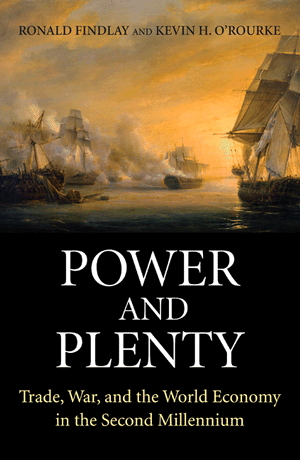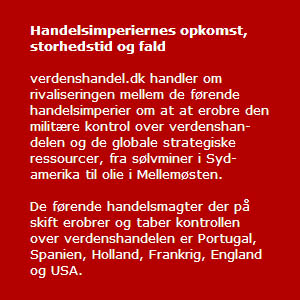 |
Konklusion
verdenshandel.dk er under konstruktion, så der er
endnu ikke skrevet en konklusion.
Konklusionen vil fokusere på historiens udviklingsårsager
med fokus på spørgsmål nævnt under indledningen
og koncept.
De teoretiske spørgsmål der søges besvaret
er nævnt under koncept,
og uddybet under teori.
For en oversigt over verdenshandelens
historie, se indledningen |
|
|
|
Videnskabsteori og determinationsteori
Law of Communicating Vessels of the World Economy.
(Korotayev 2015: 149).
Institutions and the path to the modern economy. (Greif 2006). |
|
|
|
Om fremtiden: |
Den teknologiske udviklings fremtidsperspektiver er beskrevet
i en artikel i tidsskriftet Futuriblerne:
Postindustrielle teknologier og politisk forandring:
http://artikelbibliotek.fremtidsforskning.dk/?page_id=2477 |
|
|
Fremtiden i en historisk kontekst
Kolonialismen som en ulighedsskabende proces og mulig fremtidig
konvergens mellem rige og fattige lande.
Korotayev, A, Leonid Grinin and Jack Goldstone 2015: Great Divergence
and Great Convergence. A Global Perspective.
www.researchgate.net/publication/297
... |
|
|
|
De bedst anbefalede referencer til en historisk oversigt
over verdenshandelens historie på engelsk er:
Findlay, Ronald & Kevin O'Rourke 2007: Power and Plenty,
(se synopsis i den højre spalte). |
|
|
Referencer på dansk
Niels Steensgaard, Ole Feldbæk og Kristof Glamann. |
Referencer: Handelsimperiers opkomst, storhedstid og fald
|
|
Andrade, T. (2015). The Gunpowder Age: China, military innovation,
and the rise of the West in world history. Princeton: Princeton
University Press. |
|
Braudel, Fernand 1992: The Wheels of Commerce. Civilization and
Capitalism: 15Th-18th Century -Volume 2. |
|
Brewer, J. 1989: The Sinews of Power: War, Money and the English
State, 1688-1783. |
|
Christian, D. (2004). Maps of time: An introduction to big history.
Berkeley, CA: University of California Press. |
Cimoli, M., G.Dosi and J.E. Stiglitz 2008: The Future of Industrial
Policies in the New
Millennium: Toward a Knowledge-Centered Development Agenda. Working
paper. (PDF). (Flere Joseph E. Stiglitz referencer). |
|
Cipolla, Carlo 1985: Guns, Sails, and Empires: Technological
Innovation and the Early Phases of European Expansion, 1400-
1700. Sunflower University Press. |
De Long, J. B., & Shleifer, A. (1993). Princes and merchants:
European city growth before the industrial revolution. Journal
of Law and Economics, 36, 671–702.
www.nber.org/papers/w4274 |
|
De Soto, H. (2000). The mystery of capital: Why capitalism triumphs
in the west and fails everywhere else. London: Black Swan. |
|
Faroqhi, Suraiya: The Ottoman Empire and the World Around it.
(GB). |
|
Findlay, Ronald & Kevin O'Rourke 2007: Power and Plenty:
Trade, War, and the World Economy in the Second Millennium. Princeton.
(PDF). |
|
Goldstone, J. A. (2009). Why Europe? The rise of the West in
world history: 1500–1850. New York, NY: McGraw-Hill |
Greif, A. (2006). Institutions and the path to the modern economy:
Lessons from medieval trade.
Cambridge, MA: Cambridge University Press. |
|
Hall, J. A. (1985). Powers and liberties: The causes and consequences
of the rise of the West. Berkeley, CA: University of California
Press. |
|
Held, David et al. 1999: Global Transformations. (CW). |
Korotayev, A, Leonid Grinin and Jack Goldstone 2015: Great Divergence
and Great Convergence. A Global Perspective.
www.researchgate.net/publication/297
... |
|
Kuran, T. (2011). The long divergence: How Islamic law held back
the Middle East. Princeton, NJ: Princeton University Press. |
|
Lane, Frederic 1950: "Force and Enterprise in the Creation
of Oceanic Commerce." In: The Tasks of Economic History.
(Supplemental issue of the Journal of Economic history 10, pp.
19-31. (GB). |
Leamer, Edward E. 2006: Review of Thomas L Friedman, The World
is Flat.
www.cid.harvard.edu/......pdf |
|
Lopez, Robert S. 1972: Commercial Revolution in the Middle Ages.
Prentice Hall. (GB). |
|
Mielants, E. H. (2007). The origins of capitalism and the rise
of the West. Philadelphia, PA: Temple University Press. |
|
Rasler, K. A., & Thompson, W. R. (1994). The great powers
and global struggle, 1490–1990. Lexington, KY: University
Press of Kentucky. |
|
Sanderson, S. K. (1995). Social transformations. A general
theory of historical development. Cambridge: Blackwell.
Sanderson, S. K. (1999). Macrosociology (4th ed.).
New York, NY: Longman. |
|
Smith, M. R. & Marx, L. (1994) (eds.). Does Technology Drive
History? The Dilemma of Technological Determinism. Cambridge,
Massachussetts: The MIT Press. (GB). |
|
Snooks, G. D. (1996). The dynamic society. Exploring the sources
of global change. London: Routledge.
Snooks, G. D. (1997). The ephemeral civilization. Exploding
the myth of social evolution. London: Routledge |
Steensgaard, Niels 1985: Världshandel och kulturkrockar
1500-1750.
Bra böckers världshistoria. Bd. 9. Höganäs. |
|
Tracy, James 1990: The Rise of Merchant Empires. (GB) |
|
Turchin, P. (2003). Historical dynamics: Why states rise and
fall. Princeton, NJ: Princeton University Press.
Turchin, P. (2005). War and peace and war: Life cycles of
imperial nations. New York, NY: Pi Press.
Turchin, P., & Nefedov, S. (2009). Secular cycles. Princeton,
NJ: Princeton University Press. |
|
Wallerstein, Immanuel 1974: The Modern World-System, vol. I:
Capitalist Agriculture and the Origins of the European World-Economy
in the Sixteenth Century. New York. (Se også tidsskriftet
JWSR). |
Wright, E.O. et al. 2005: Approaches to Class Analysis. (GB).
Se flere værker her (GB). |
|
Projekter |
Europe and the Sea
Olesen, Thorsten Borring (Projektdeltager)
Andersen, Casper (Projektdeltager)
Thelle, Mikkel (Projektdeltager)
Elvert, Jürgen, Univeersität zu Köln. (Projektleder,
faglig).
www.ure.au.dk/portal/da/projects/europe-and-the-sea
... |
|

|
|
Synopsis
International trade has shaped the modern world, yet until now
no single book has been available for both economists and general
readers that traces the history of the international economy
from its earliest beginnings to the present day. Power and Plenty
fills this gap, providing the first full account of world trade
and development over the course of the last millennium.
Ronald Findlay and Kevin O'Rourke examine the successive waves
of globalization and "deglobalization" that have occurred
during the past thousand years, looking closely at the technological
and political causes behind these long-term trends.
They show how the expansion and contraction of the world
economy has been directly tied to the two-way interplay of trade
and geopolitics, and how war and peace have been critical
determinants of international trade over the very long run. The
story they tell is sweeping in scope, one that links the emergence
of the Western economies with economic and political developments
throughout Eurasia centuries ago.
Findlay and O'Rourke demonstrate the close interrelationships
of trade and warfare, the mutual interdependence of the
world's different regions, and the crucial role these factors
have played in explaining modern economic growth.
"Power and Plenty" is a must-read for anyone seeking
to understand the origins of today's international economy, the
forces that continue to shape it, and the economic and political
challenges confronting policymakers in the twenty-first century.
www.amazon.co.uk/Power-Plenty... |
|





















